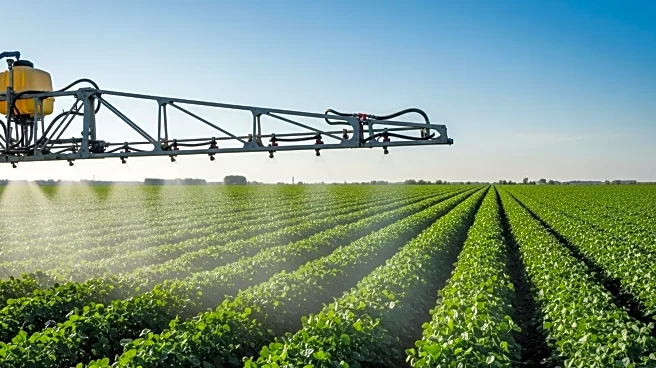What's Happening?
BASF has announced that its Zorina fungicide has received registration approval from the U.S. Environmental Protection Agency (EPA), allowing its use across the United States, pending state approvals. Zorina fungicide is designed to address white mold, a significant yield-limiting disease affecting crops such as soybeans, canola, and dry beans in the Midwest and Northern Plains. The fungicide combines the proven performance of Endura fungicide with the broad-spectrum control of Revysol fungicide, offering farmers a robust solution to maximize yield potential. Erick Garcia, Senior Product Manager at BASF Agricultural Solutions, emphasized the importance of proactive disease management to prevent white mold from taking hold in fields.
Why It's Important?
The approval of Zorina fungicide is a critical development for U.S. agriculture, particularly for soybean farmers who have faced substantial yield losses due to white mold. In 2024, the disease resulted in an estimated loss of over 26.1 million bushels of soybeans. By providing effective control against white mold and other foliar diseases, Zorina fungicide can help farmers protect their crops and improve yield outcomes. This advancement supports BASF's commitment to sustainable farming practices and addresses the growing need for innovative solutions in agriculture to meet the demands of a rapidly increasing global population.
What's Next?
Farmers are encouraged to apply Zorina fungicide preventively at full bloom when crops are most susceptible to infection. BASF will continue to work with local representatives to ensure farmers have access to this new fungicide and understand its application guidelines. As the pressure from white mold increases, BASF's focus will remain on providing solutions that help farmers overcome yield barriers and maintain sustainable agricultural practices.
Beyond the Headlines
The introduction of Zorina fungicide highlights the ongoing efforts by chemical companies like BASF to integrate sustainability into their business models. By investing in research and development, BASF aims to provide solutions that not only enhance crop yields but also reduce environmental impacts. This approach aligns with broader industry trends towards sustainable agriculture and reflects the growing importance of environmental responsibility in business operations.










